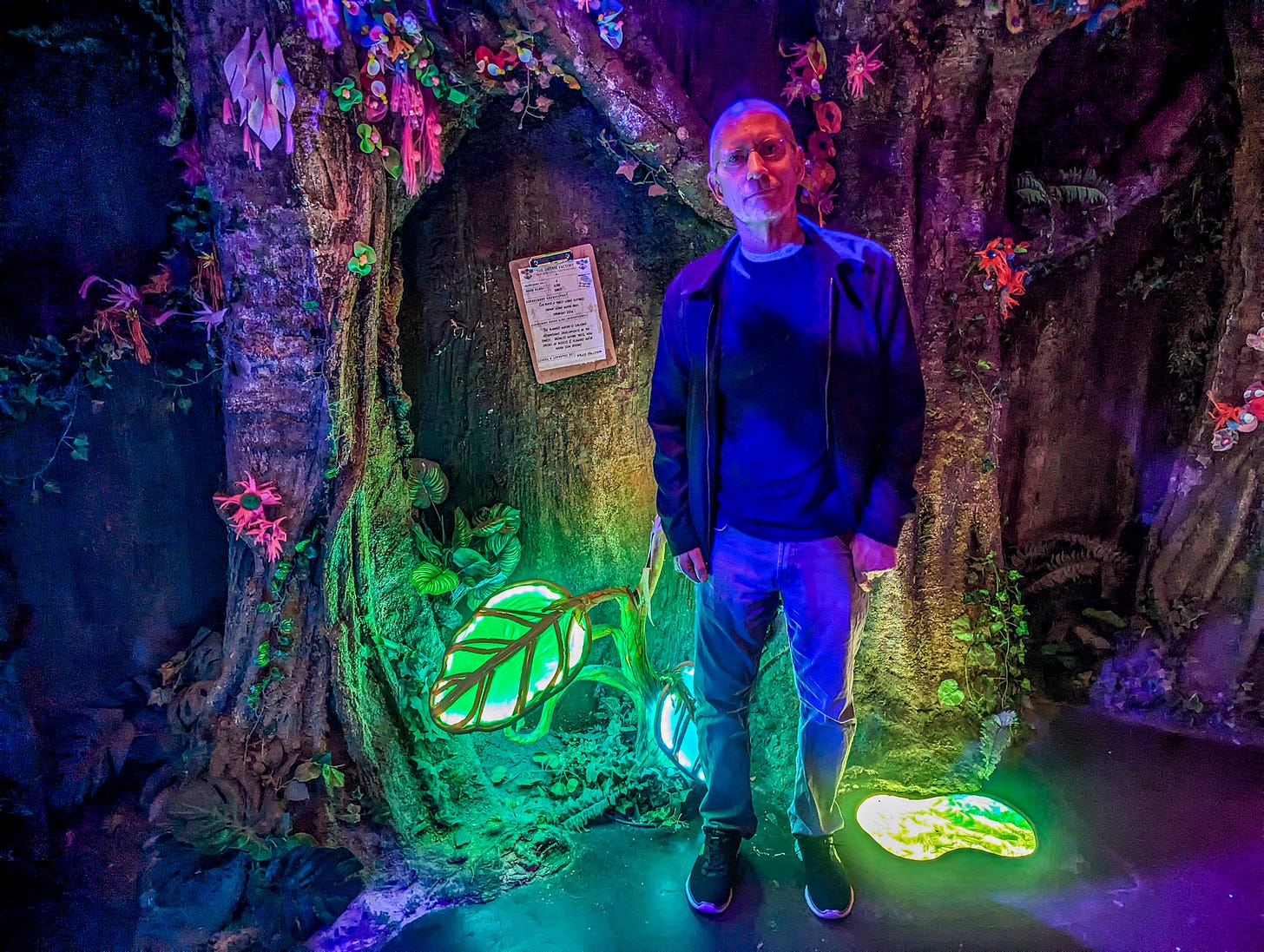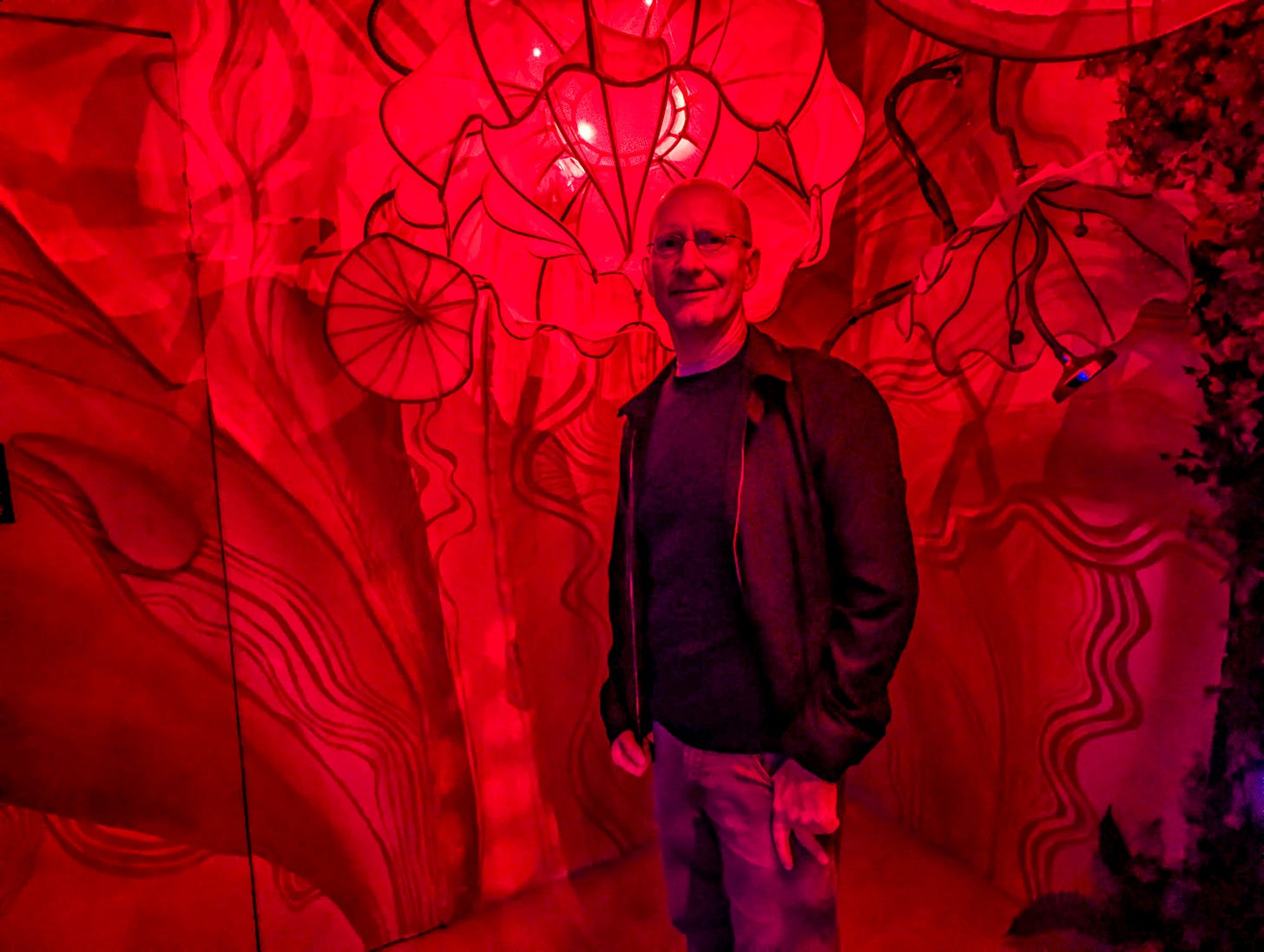Spectacle Without Story is Boring
Every time a new Jurassic Park movie comes out, I think, "Even if it sucks, it will still have cool dinosaurs!" And every time, I'm bored anyway.
I just returned from Wake the Tiger, a walk-through “immersive experience” in Bristol, England, where I’m currently living. Wake the Tiger calls itself “the world’s first amazement park,” and it turned out to be a massive warehouse full of sometimes dazzling interactive art exhibits that all work together to tell a loose story.
A very loose story.
Basically, you start in what they say is an abandoned paint factory that once saw the appearance of strange, otherworldly mushrooms. It turns out the mushrooms have opened a portal, which you enter, that leads to a dystopian realm called Meridia.
But Meridia’s mostly unseen survivors have banded together to create something called the Dream Factory, where they have been mixing the mysterious fungi with the elements of fire, water, earth, and air, creating a fifth element called “aether” that has made an interdimensional crack leading to a place you ultimately visit called the OUTERverse.
In terms of visuals, it’s all pretty well done. It’s hard not to appreciate the craft and expense that went into these installations. And I like that it’s intereactive-ish: you can occasionally turn dials and read messages, and there is a secret passage or two to discover.
But I confess, my interest fell pretty quickly. And by the end, I was more or less bored.
The problem is that it’s all exposition: background and world-building. It’s intriguing and could be the set-up to a cool story. But there’s nothing to engage you — no stakes, tension, or even any characters, except for a few costumed staff members who make a cryptic comment or two but mostly stand around looking bored.
It’s like walking around inside a video game where there’s no danger to your character and also no goal. That can be interesting too — for about five minutes. After that, it doesn’t matter how cool the graphics are.
Wake the Tiger reminded me how every time a new Jurassic Park movie comes out, I think, “Okay, I’m sure this movie is terrible, but at least the special effects will be great. They’ll be lots of cool dinosaurs!”
And then I see it, and yeah, the dinosaurs always look great, but the movie is always terrible, and after five minutes, I’m bored out of my mind.
(I did think the last Jurassic Park movie — the one where Laura Dern and Sam Neill came back — wasn’t terrible. But it also annoyed me because it was just good enough that it probably means there’ll now be fifteen more Jurassic Park movies.)
Anyway, I never learn. Although maybe I have finally learned about superhero movies because I haven’t seen one in about ten years.
I think what finally killed superhero movies for me was the realization that even if something happens — if there is something interesting in one particular movie — there aren’t really any stakes because the franchise owners won’t allow it. Every movie is part of a never-ending “paracosm,” and everything will always be reset or rebooted — or, oh, wait, never mind, the story I just watched doesn’t matter because it took place in some alternative dimension.
For me, it’s so obviously the sound and the fury signifying nothing.
The greater point is that I find spectacle without a compelling story boring. To hold my attention for more than five minutes, I need to care about what I’m experiencing — to feel something.
Is it just me? I’ve definitely always been a “plot” guy.
As a writer of fiction, I’ve always seen myself, first and foremost, as a storyteller. The way I see it, character and story are two sides of the same coin: story illustrates character, and character creates story. Why must this story be about this character?
And where is this story going? How will this particular sequence of events delight or shock or move my audience? How do I create an ending that will be completely unexpected yet seem inevitable in retrospect? And does everything hang together and make sense?
This is how I feel as a media consumer, too. Sure, in novels, I can appreciate beautiful language and quirky characters. And in movies, I can enjoy good acting and great special effects.
But for me, these are all just tools to serve a greater purpose: the story itself. No matter how amazing these individual pieces might be, I get equally frustrated when there’s virtually no plot (as in a lot of literary fiction and arthouse movies) as when the plot is perfunctory or cliche (as in a lot of genre fiction and popcorn films).
A good story is hard. I think that's why so many arthouse films, literary novels, genre books, and popcorn movies don't have one. In my opinion, a truly compelling story is just about the hardest thing a writer can do.
The same goes for “amazement parks,” too, I guess.
But maybe this all really is just me. What do others think?
P.S. Britain’s Wake the Tiger is so similar to Meow Wolf, an attraction in America, that the latter’s creators are suing the former for copyright infringement. My husband Michael has seen both and agrees that Wake the Tiger is a total ripoff.
Brent Hartinger is a screenwriter and author. Check out his other newsletter about his travels at BrentAndMichaelAreGoingPlaces.com.







Agreed!
I think this is also why I’m often uninterested in fight/battle scenes. Too often they’re just action for action’s sake—to be able to say something happened in a book, or to show off special effects and fight choreography in a film. And, in too many cases, it’s already clear who will win, and the outcome doesn’t surprise us. I only care about such scenes when the writers have done the story and character work beforehand, to the degree that we care about these characters and are genuinely concerned they might not achieve their goal, and might in fact suffer a terrible setback (or even get killed). (Shoutout to Lord of the Rings for having battle scenes I actually find riveting and moving!)
As a friend of mine once said of superhero movies, “When everything’s at stake, nothing is”